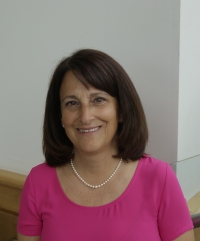Leading Care: Dr. Bette Mariani and the International Nursing Association for Clinical Simulation and Learning
In this interview, Bette A. Mariani ’82 BSN, PhD, RN, ANEF reflects on her leadership in advancing nursing through service in a professional organization.
She is associate professor, Fitzpatrick College of Nursing; and Immediate past-president, International Nursing Association for Clinical Simulation and Learning
(INACSL), 2019-2020.

How did you rise to this leadership position? I became a leader in simulation initially through my teaching, scholarship, and research at Villanova through collaboration with other faculty and colleagues. This led me to my involvement with INACSL first as a committee member on the Research Committee, followed by 2 terms as Chair of the Research Committee. With my continued engagement in the organization, the opportunity to pursue the position of President provided the opportunity for me contribute to the strategic vision for INACSL, as we continue to advance the science of simulation around the globe as one of the leading organization in healthcare simulation.
Who influenced you? At Villanova, there were two colleagues who were most instrumental in encouraging me in my journey as a leader in simulation, Colleen Meakim and Mary Ann Cantrell. Between Colleen’s expertise in simulation, as the Director of the Simulation Lab and her tenure as an officer in INACSL, and Mary Ann’s experience and expertise in research and simulation, I had the much needed mentorship and support that provided these opportunities for my growth as a leader in education and simulation.
Why is it important to you? Why are you enthusiastic about your work in this role? My leadership role in simulation and nursing education is important to me, as this is the future of nursing and healthcare education. And it is critical that we continue to advance the science, and evidence for simulation, that is critical to educating the next generation of healthcare professionals, as well as current practitioners. Additionally, a leadership position provides the opportunity to mentor and support novice and mid-career educators and simulationists literally around the globe. Part of my work as the President has been dedicated to continuing the international reach of the organization. Helping those around the world who are just beginning their simulation programs and seeing their enthusiasm for it, is one of the most exciting parts of the role.
What are the issues you deal with and what’s the biggest challenge in your area? Probably one of the most challenging issues is to be sure that you are including all members in the work that you do, because our members are the mainstay of the organization, and we do not want any member to feel less valued than any other member. Additionally, it is important to provide ongoing enthusiasm. INACSL is mostly avolunteer organization, and the work of our volunteers is invaluable, but sustaining that vision, and enthusiasm can be difficult with competing responsibilities.
How are you effective in your role? What’s critical to your success in the role? I believe I am effective in my role of moving the organization in achieving its goals and meeting the goals and objectives of the strategic plan. I think communication and staying try to the mission and vision of the organization with integrity, openness and honesty is probably one of the most critical aspects of the role. People want to know they can trust you, and know that they can openly communicate and share their ideas and thoughts.
How does innovation fit into your role as leader? INACSL is an organization dedicated to advancing simulation and innovation, so innovative and new ways of doing things is critical to our organization.
Is there anything you wish you’d done differently on your rise to this position or while in it? Right now, nothing comes to mind, by I am sure there were some moments. I am happy that those moments do not overshadow the times that I feel positive about the role. I think the most important thing is to learn from any areas where you think you could have done something differently.
What’s your advice to someone who wants to be a leader in their area of interest? Collaborate with other experts or leaders in the field, find yourself a good mentor or two, that will be honest and open with you, but also be willing to push you beyond what you thought were your limits. Dream big and be happy; do things for the right reason, and always be honest.
What is your leadership philosophy? My leadership philosophy begins with honesty, integrity, and communication. As a leader, you have to be able to listen and engage with others, be open to new ideas, but stay true to your values, and the mission and vision of the organization in which you are leading. As a leader, it is critical to be well-informed, knowledgeable, and colleagial, but to also know when a particular situation may require you to take the lead. A leader should be a good role model, and leade by example.
What’s your hope for our profession? My hope for the profession is that we continue to grow in our science and caring as a well-respected, intelligent, honest, profession with impeccable integrity dedicated to advancing health and well-being around the globe through collaboration and collegiality. Additionally, I would like to see us embrace nursing in all settings to achieve these goals.
